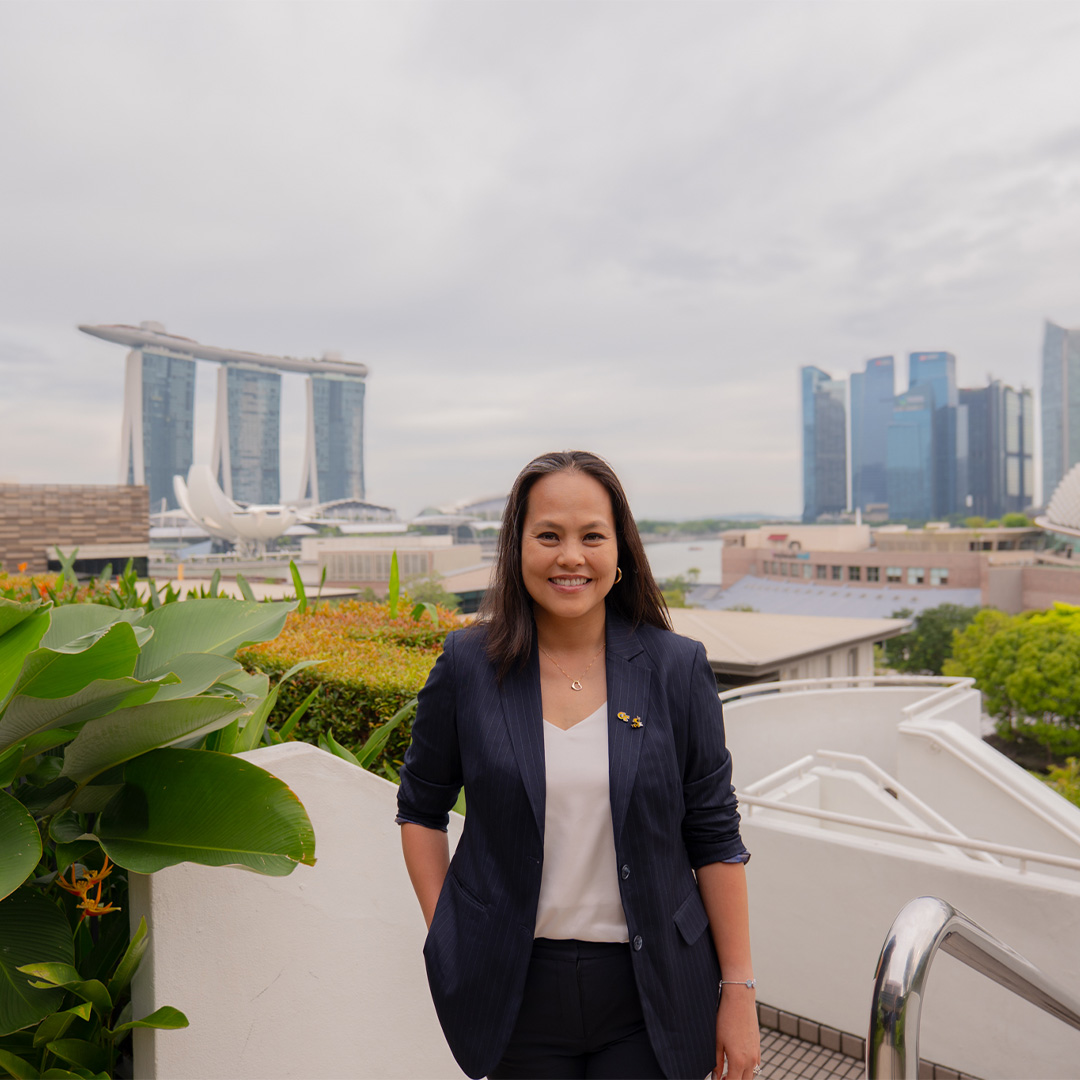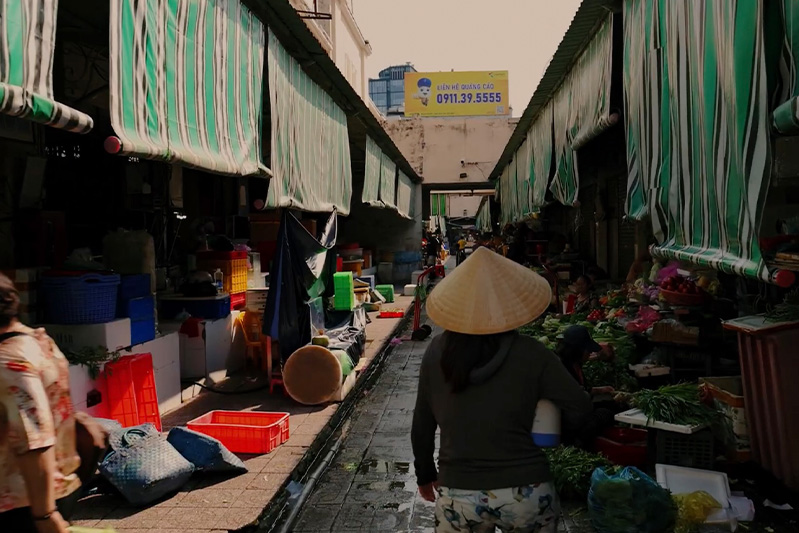Written by Hawn Nguyen-Loughren, Executive MBA ‘25
It was a hot and humid morning in Vietnam. I sat at a café in District 1, savoring my morning Cà Phê Sữa Đá (Vietnamese coffee) and a freshly made bánh mì. As the sun rose over the bustling streets, I gazed at the soaring skyline of Ho Chi Minh City in awe. The transformation from the Vietnam I remembered as a child to today’s vibrant, modern, and rapidly emerging market was nothing short of astonishing—an evolution so profound it felt almost unrecognizable.
In April 2025, I had the extraordinary opportunity to participate in an international residency as part of the Georgia Tech Executive MBA program. Our journey took us to Vietnam and Singapore—two nations that, while vastly different in size and maturity, both represent powerful models of economic resilience, cultural identity, and global ambition.
For me, this experience held a deeper meaning. I was born in Vietnam, and returning as an Executive MBA student during such a historic moment—the eve of the 50th anniversary of the Reunification of Vietnam—was profoundly emotional. Witnessing the spirit, resilience, humility, and courage of the Vietnamese people, and the extraordinary transformation since the war’s end in 1975, was deeply moving.
Vietnam: The Rising Dragon
Resilience, Rebirth, and Rapid Growth
Vietnam is often referred to as the “Rising Dragon”—a symbolic phrase reflecting its rapid economic growth, increasing geopolitical relevance, and cultural heritage tied to the dragon as a traditional emblem of power and prosperity in East Asian mythology.
Vietnam is rewriting its global narrative. Once defined by conflict and recovery, today it is viewed as a rising economic power, thriving in sectors like manufacturing, logistics, renewable energy, and technology. Ho Chi Minh City, the heartbeat of this transformation, radiated both tradition and progress.
During our visit, we met with leaders at organizations including:
- VinaCapital, where we learned about Vietnam’s maturing investment ecosystem and the country’s impressive economic forecasts.
- Phu My Hung, which focuses on quality, integrity, and trusted partnerships, aiming to achieve sustainable growth through innovation, strategic collaborations, and investment in people.
- FPT Software, showcasing Vietnam’s leadership in cloud computing, AI, and enterprise digital transformation.
- VinFast, a symbol of Vietnam’s global ambitions in electric vehicles and sustainable automotive innovation.
- DHL, where we discussed Vietnam’s growing role in regional logistics and the ongoing shift in supply chains toward Southeast Asia.
- SPS Vietnam, which reinforced how the nation is evolving from a low-cost manufacturing center to a premium business process outsourcing (BPO) back-office and enterprise workplace solutions (EWS) services destination.
The most moving part of the experience was personal. Strolling through the streets of the city I was born in offered a powerful moment of reflection. I reconnected with my heritage while seeing the Vietnam of the future: young, ambitious, and globally engaged.
Singapore: The Mighty Little Red Dot
Precision, Strategy, and Purpose
In contrast to Vietnam’s raw momentum, Singapore delivered a masterclass in strategic foresight and innovation governance. Affectionately known as the “Little Red Dot,” Singapore may appear small on the map, but it commands a remarkable presence on the global stage. Once a dismissive label, the term has evolved into a symbol of national pride, reflecting Singapore’s resilience, unity, and world-class achievements. Singapore has leveraged its limited size into an outsized global presence across finance, technology, and trade.
Our engagements included:
- Deloitte, where we explored Singapore’s fintech ecosystem and the regulatory strength of the Monetary Authority of Singapore (MAS).
- IBM, where we discussed AI governance, quantum computing, responsible tech leadership, and workforce transformation.
- Mastercard, which shared cutting-edge advances in digital payments and financial inclusion across the Asia-Pacific area.
- X-Inc Pte Ltd (FoodXervices) - The Food Bank Singapore, a nonprofit blending social enterprise with sustainability and community impact.
- Finally, a closing panel brought together industry leaders who shared insights on global expansion strategies, the future of digital innovation, and the critical role of sustainability in modern business. The panelists included Arjay Gavankar (Growth Capital Partners), Vishal Singhvi (Microsoft Singapore), Benjamin Tan (World Vision Singapore), and Karthik Venkatakrishnan (NielsenIQ), who offered diverse yet complementary perspectives on how to lead effectively in a rapidly changing world.
We also had the chance to explore Singapore’s iconic infrastructure, from Gardens by the Bay to Marina Bay Sands, and reflect on how intentional design, inclusive innovation, and cross-sector collaboration shape the city’s competitive edge.
Why It Matters
The international residency was more than just a trip abroad—it was an immersive cultural experience with moments of transformation. Vietnam’s rapid economic growth, thriving key industries, and evolving business landscape highlight its dynamic position in the global market. Singapore’s role as an international financial powerhouse and strategic gateway to Asia showed what’s possible when bold leadership meets clear vision.
Reconnecting with my roots was enlightening. From the beautiful, organized chaos of the lively city streets with swerving and honking motorbikes to the raw beauty of its landscape, Vietnam is a true gem. Seeing its heart through the eyes of the people and their warmth, authenticity, humility, and resilience was truly extraordinary and captivating. It is a powerful testament to the strength of the human spirit.
Singapore’s national ethos—“Every Singaporean a lifelong learner”—left a lasting impression. It reaffirmed the importance of continuous growth, curiosity, and adaptability in a world defined by rapid change. This spirit of lifelong learning mirrors our journey at Scheller and underscores what it means to lead with purpose and perspective in today’s global business landscape.
With that, I now carry with me the following lessons:
- Cross-cultural communication and diplomacy: Understanding the cultural contexts that shape negotiation, collaboration, and leadership across borders.
- Strategic innovation and regulatory agility: Observing how nations like Singapore leverage policy and foresight to stay competitive, while Vietnam exemplifies adaptive innovation in emerging markets.
- Social impact and responsible leadership: Witnessing how organizations embed sustainability and inclusivity into their core missions, from Food Bank Singapore to VinFast’s electric vehicle ambitions.
- Heritage, humility, and global perspective: Reconnecting with my Vietnamese roots reminded me that leadership is not only about moving forward towards the future, but also about honoring the journey that brought us here.
I am grateful to the Georgia Tech Scheller College of Business for curating such a meaningful experience—one that not only enhanced my understanding of international business but deepened my perspective as a globally-minded leader.

